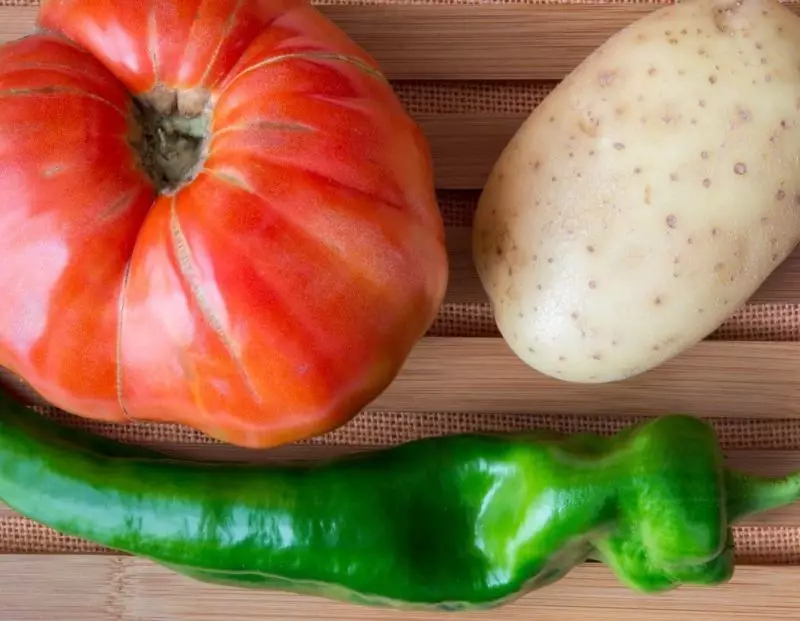
Vegetables are an irreplaceable part of every healthy and diverse diet. In fact, The USDA recommends eating 4-5 servings of veggies per day for optimal nutrition (for adult men and women), together with enough fruits, whole grains, lean protein, and low-fat dairy. [1]
But did you know that some vegetables are thought to have a negative effect on human health because of their estimated proinflammatory properties? The so-called Nightshade vegetables are often excluded from the diet of patients with autoimmune and inflammatory diseases in order to improve their condition and slow the progression of these health conditions.
But how come the consumption and limitation of vegetables are recommended at the same time? What vegetables are Nightshade? Do they really cause inflammation? Should you avoid them?
This article will guide you through the answers to all of these questions!
Let’s get started!

Nightshade vegetables and inflammation
Nightshade vegetables are veggies that contain important micronutrients alongside antioxidants and fiber. However, all of them include trace amounts of Solanine: an alkaloid that may have toxic effects on the human body when consumed in large amounts. [2]
That being said, there is only limited evidence supporting the claim that eating nightshade vegetables leads to inflammation! In fact, the available evidence suggests that some nightshade vegetables may have anti-inflammatory effects, and the benefits of consuming these veggies likely outweigh the risks. [3]
Most popular nightshade vegetables
- Tomatoes
- Potatoes (except sweet potatoes). Keep in mind that green potatoes (or potatoes with green patches) are evidenced to have significantly higher amounts of Solanine. [4]
- Eggplants
- Bell peppers
- Spices sourced from peppers: cayenne and paprika
- Goji berry

Should you avoid nightshade vegetables?
Generally, it’s not recommended to avoid eating nightshade vegetables without specific advice from your healthcare provider. As mentioned, the popular nightshades contain important nutrients, which may help us improve our health and wellbeing when integrated into a diverse and balanced diet.
Nutrients
According to a paper published in the blog of Colorado State University, nightshade veggies contain the following healthy dietary compounds (among others) [5] :
- Vitamin C (antioxidant compound found in peppers and tomatoes)
- Capsaicin (compound with anti-inflammatory and pain-relieving properties, found in spicy peppers: it gives the spicy taste)
- Lycopene (antioxidant found in red tomatoes, which is associated with decreased risk of cancer development)
- Anthocyanin (nutrient associated with decreased risk of heart disease, cancer prevention, and brain health, found in purple potatoes and eggplants)
- Fiber (compound associated with heart and gut health support, cholesterol and blood sugar balance, as well as weight management)

Impact on health conditions
Arthritis
According to the Arthritis Foundation, overconsumption of nightshade veggies may lead to worsening arthritis symptoms and more pronounced joint pain and inflammation in some individuals. [6] Yet, the source notes that this is unlikely to happen.
Furthermore, according to Dr. Micah Yu (a rheumatology fellow at Loma Linda University Medical Center in California), limiting the intake of more obvious inflammatory foods (rather than veggies) may benefit arthritis symptoms to a greater extent. [8] Such foods include:
- Foods high in processed sugar
- Processed and packaged foods
- High-salt foods
- Red meat

Irritable Bowel Syndrome (IBS)
According to a 2020 paper published in the Circulation Journal, excluding foods containing lectins (like grains, nightshade veggies, beans, and corn) may positively affect patients with “leaky gut” or increased intestinal permeability (can be caused by Irritable Bowel Syndrome and Celiac Disease). [9] [10]
Inflammatory Bowel Disease (IBD)
Evidence suggests that following the Autoimmune Protocol Diet for at least 3 weeks may improve the symptoms of Inflammatory Bowel Disease and lead to enhanced life quality of patients with Crohn’s disease and ulcerative colitis. [11] [12]
Autoimmune Protocol Diet focuses on excluding the following food groups [12] :
- Grains
- Legumes
- Nightshade veggies
- Eggs
- Dairy
- Nuts and seeds
- Coffee
- Alcohol
- Refined/processed sugars
- Industrial seed oils
- Food additives

Other autoimmune diseases
Evidence suggests that the Autoimmune Protocol Diet may also positively affect patients with various autoimmune diseases such as [13][14] :
- Hashimoto’s Disease
- Rheumatoid Arthritis
- Coeliac Disease
- Adrenal fatigue
- Recurrent viral infections or low immunity
- Polycystic Ovarian Syndrome (PCOS)
- Multiple Sclerosis
- Sjogren’s
- Type 1 Diabetes
- Lupus (SLE)
This way, limiting the consumption of nightshade vegetables (and other foods mentioned in the previous section) may benefit various autoimmune conditions.








